- Home
- Alfred Bester
The Stars My Destination Page 2
The Stars My Destination Read online
Page 2
He lived in the only air-tight room left intact in the wreck, a tool locker of the main-deck corridor. The locker was four feet wide, four feet deep and nine feet high. It was the size of a giant's coffin. Six hundred years before, it had been judged the most exquisite Oriental torture to imprison a man in a cage that size for a few weeks. Yet Foyle had existed in that lightless cage for five months, twenty days and four hours.
'Who are you?'
'Gully Foyle is my name.'
'Where are you from?'
'Terra is my nation.'
'Where are you now?'
'Deep space is my dwelling place.'
'Where are you bound?'
'Death's my destination.'
On the one hundred and seventy-first day of his fight for survival, Foyle answered these questions and awoke. His heart hammered and his throat burned. He groped in the dark for the air tank, which shared his coffin with him and checked it. The tank was empty. Another would have to be moved in at once. So this day would commence with an extra skirmish with death which Foyle accepted with mute endurance.
He felt through the locker shelves and located a torn spacesuit. It was the only one aboard Nomad and Foyle no longer remembered where or how he had found it. He had sealed the tear with emergency spray, but had no way of refilling or replacing the empty oxygen cartridges on the back. Foyle got into the suit. It would hold enough air from the locker to allow him five minutes in vacuum . . . no more.
Foyle opened the locker door and plunged out into the black frost of space. The air in the locker puffed out with him and its moisture congealed into a tiny snow cloud that drifted down the torn main-deck corridor. Foyle heaved at the exhausted air tank, floated it out of the locker and abandoned it. One minute was gone.
He turned and propelled himself through the floating debris towards the hatch to the ballast hold. He did not run; his gait was the unique locomotion of free-fall and weightlessness . . . thrusts with foot, elbow and hand against deck, wall and corner, a slow-motion darting through space like a bat flying under water. Foyle shot through the hatch into the darkside ballast hold. Two minutes were gone.
Like all spaceships, Nomad was ballasted and stiffened with the mass of her gas tanks laid down the length of her keel like a long lumber raft tapped at the sides by a labyrinth of pipe fittings. Foyle took a minute disconnecting an air tank. He had no way of knowing whether it was full or already exhausted; whether he would fight it back to his locker only to discover that it was empty and his life was ended. Once a week he endured this game of space-poker.
There was a roaring in his ears; the air in his spacesuit was rapidly going foul. He yanked the massy cylinder towards the ballast hatch, ducked to let it sail over his head, then thrust himself after it. He swung the tank through the hatch. Four minutes had elapsed and he was shaking and blacking out. He guided the tank down the main-deck corridor and bulled it into the tool locker.
He slammed the locked door, dogged it, found a hammer on a shelf and swung it thrice against the frozen tank to loosen the valve. Foyle twisted the handle grimly. With the last of his strength he unsealed the helmet of his spacesuit, lest he suffocate within the suit while the locker filled with air . . . if this tank contained air. He fainted, as he had fainted so often before, never knowing whether this was death.
'Who are you?'
'Gully Foyle.'
'Where are you from?'
'Terra'
'Where are you now?'
'Space.'
'Where are you bound?'
He awoke. He was alive. He wasted no time on prayer or thanks but continued the business of survival. In the darkness he explored the locker shelves where he kept his rations. There were only a few packets left. Since he was already wearing the patched spacesuit he might just as well run the gauntlet of vacuum again and replenish his supplies.
He flooded his spacesuit with sir from the tank, resealed his helmet and sailed out into the frost and light again. He squirmed down the main-deck corridor and ascended the remains of a stairway to control-deck, which was no more than a roofed corridor in space, most of the walls were destroyed.
With the sun on his right and the stars on his left, Foyle shot aft towards the galley storeroom. Halfway down the corridor he passed a door-frame still standing foursquare between deck and roof. The leaf still hung on its hinges, half open, a door to nowhere. Behind it was all space and the steady stars.
As Foyle passed the door he had a quick view of himself reflected in the polished chrome of the leaf . . . Gully Foyle, a giant black creature, bearded, crusted with dried blood and filth, emaciated, with sick, patient eyes . . . and followed always by a stream of floating debris, the raffle disturbed by his motion and following him through space like the tail of a festering comet.
Foyle turned into the galley storeroom and began looting with the methodical speed of five months' habit. Most of the bottled goods were frozen solid and exploded. Many of the canned goods had lost their containers, for tin crumbles to dust in the absolute zero of space. Foyle gathered up ration; packets, concentrates and a chunk of ice from the burst water tank. He threw everything into a large copper cauldron and then turned and darted out of the storeroom, carrying the cauldron.
At the door to nowhere Foyle glanced at himself again, reflected in the chrome leaf framed in the stars. Then he stopped his motion in bewilderment. He stared at the stars behind the door, which had become familiar friends after five months. There was an intruder among them; a comet, it seemed, with an invisible head and a short, spurting tail. Then Foyle realized he was staring at a spaceship, stern rockets flaring as it accelerated on a sunward course that must pass him.
'No,' he muttered. 'No, man. No.' He was continually suffering firm hallucinations. He turned to resume the journey back to his coffin. Then he looked again. It was still a spaceship, stern rockets flaring as it accelerated on a sunward course which must pass him. He discussed the illusion with Eternity.
'Six months already,' he said in his gutter tongue. 'Is it now? You listen a me, Heels. I talkin' a deal, is all. I look again, sweet Heels. If it's a ship, I'm yours. You own me. But if it's a gaff, man . . . if it's no ship . . . I unseal right now and blow my guts. We both play square, us. Now reach me the sign, yes or no, is all.'
He looked for a third time. For the third time he saw a spaceship, stern rockets flaring as it accelerated on a sunward course which must pass him.
It was the sign. He believed. He was saved.
Foyle shoved off and went hurtling down control-deck corridor towards the bridge. But at the companionway stairs he restrained himself. He could not remain conscious for more than a few moments without refilling his spacesuit. He gave the approaching spaceship one pleading look, then shot down to the tool locker and pumped his suit full.
He mounted to the control bridge. Through the starboard observation port he saw the spaceship, stern rockets still flaring, evidently making a major alteration in course, for it was bearing down on him very slowly.
On the panel marked FLARES, Foyle pressed the DISTRESS button. There was a three-second pause during which he suffered. Then white radiance blinded him as the distress signal went off in three triple bursts, nine prayers for help. Foyle pressed the button twice again, and twice more the flares flashed in space while the radioactives incorporated in their combustion set up a static howl that must register on any waveband of any receiver.
The stranger's jets cut off. He had been seen. He would be saved. He was reborn. He exulted.
Foyle darted back to his locker and replenished his spacesuit again. He began to weep. He started to gather his possessions . . . a faceless clock which he kept wound just to listen to the ticking, a lug wrench with a hand-shaped handle which he would hold in lonely moments, an egg-sliver upon whose wires he would pluck primitive tunes . . . He dropped them in his excitement, hunted for them in the dark, then began to laugh at himself.
He filled his spacesuit with air once more and caper
ed back to the bridge. He punched a flare button labeled: RESCUE. From the hull of the Nomad shot a sunlet that burst and hung, flooding miles of space with a harsh white light.
'Come on, baby you,' Foyle crooned. 'Hurry up, man. Come on, baby, baby you.' Like a ghost torpedo, the stranger slid into the outermost rim of light, approaching slowly, looking him over. For a moment Foyle's heart constricted; the ship was behaving so cautiously that he feared she was an enemy vessel from the Outer Satellites. Then he saw the famous red and blue emblem on her side, the trademark of the mighty industrial clan of Presteign; Presteign of Terra, powerful, munificent, beneficent And he knew this was a sister ship, for the Nomad was also Presteign owned. He knew this was an angel from space hovering over him.
'Sweet, sister,' Foyle crooned. 'Baby angel, fly away home with me.' The ship came abreast of Foyle, illuminated ports along its side glowing with friendly light, its name and registry number clearly visible in illuminated figures on the hull: Vorga-T: 1339. The ship was alongside him in a moment, passing him in a second, disappearing in a third.
The sister had spurned him; the angel had abandoned him.
Foyle stopped dancing and crooning. He stared in dismay. He leaped to the flare panel and slapped buttons. Distress signals, landing, takeoff and quarantine flares burst from the hull of the Nomad in a madness of white, red and green light, pulsing, pleading . . . and Vorga-T: 1339 passed silently and implacably, stern jets flaring again as it accelerated on a sunward course.
So, in five seconds, he was born, he lived and he died. After thirty years of existence and six months of torture, Gully Foyle, the stereotype Common Man was no more. The key turned in the lock of his soul and the door was opened. What emerged expunged the Common Man for ever.
'You pass me by,' he said with slow mounting fury. 'You leave me rot like a dog. You leave me die, Vorga . . . Vorga-T: 1339, No. I get out of here, me. I follow you, Vorga. I find you, Yorga. I pay you back, me. I rot you. I kill you, Yorga. I kill you deadly.'
The acid of fury ran through him, eating away the brute patience and sluggishness that had made a cipher of Gully Foyle, precipitating a chain of reactions that would make an infernal machine of Gully Foyle. He was dedicated.
'Vorga, I kill you deadly.' He did what the cipher could not do; he rescued himself.
For two days he combed the wreckage in five-minute forays, and devised a harness for his shoulders. He attached an air tank to the harness and connected the tank to his spacesuit helmet with an improvised hose. He wriggled through space like an ant dragging a log, but he had the freedom of the Nomad for all time.
He thought.
In the control bridge he taught himself to use the few navigation instruments that were still unbroken, studying the standard manuals that littered the wrecked navigation room. In the ten years of his service in space he had never dreamed of attempting such a thing, despite the rewards of promotion and pay; but now he had Vorga-T: 1339 to reward him.
He took sights. The Nomad was drifting in space on the ecliptic, three hundred million miles from the sun. Before him were spread the constellations Perseus, Andromeda and Pisces. Hanging almost in the foreground was a dusty orange spot that was Jupiter, distinctly a planetary disc to the naked eye. With any luck he could make a course for Jupiter and rescue.
Jupiter was not, could never be habitable. Like all the outer planets beyond the asteroid orbits, it was a frozen mass of methane and ammonia; but its four largest satellites swarmed with cities and populations now at war with the Inner Planets. He would be a war prisoner, but he had to stay alive to settle accounts with Vorga-T: 1339. Foyle inspected the engine-room of the Nomad. There was Hi-Thrust fuel remaining in the tanks and one of the four tail jets was still in operative condition. Foyle found the engine-room manuals and studied them. He repaired the connection between fuel tanks and the one jet chamber. The tanks were on the sunside of the wreck and warmed above freezing point. The Hi-Thrust was still liquid, but it would not flow. In freefall there was no gravity to draw the fuel down the pipes.
Foyle studied a space manual and learned something about theoretical gravity. If he could put the Nomad into a spin, centrifugal force would impart enough navigation to the ship to draw fuel down into the combustion chamber of the jet. If he could fire the combustion chamber, the unequal thrust of the one jet would impart a spin to the Nomad.
But he couldn't fire the jet without first having the spin; and he couldn't get the spin without first firing the jet.
He thought his way out of the deadlock; he was inspired by Vorga.
Foyle opened the drainage petcock in the combustion chamber of the jet and tortuously filled the chamber with fuel by hand. He had primed the pump. Now, if he ignited the fuel, it would fire long enough to impart the spin and start gravity. Then the flow from the tanks would commence and the rocketing would continue.
He tried matches.
Matches will not burn in the vacuum of space.
He tried flint and steel.
Sparks will not glow in the absolute zero of space.
He thought of red-hot filaments.
He had no electric power of any description aboard the Nomad to make a filament red-hot.
He found texts and read. Although he was blacking out frequently and close to complete collapse, he thought and planned. He was inspired to greatness by Vorga.
Foyle brought ice from the frozen galley tanks, melted it and added water to the jet combustion chamber. The fuel and the water were non-miscible, they did not mix. The water floated in a thin layer over the fuel.
From the chemical stores Foyle brought a silvery bit of wire, pure sodium metal. He poked the wire through the open petcock. The sodium ignited when it touched the water and flared with high heat. The heat touched off the Hi-Thrust which burst in a needle flame from the petcock. Foyle closed the petcock with a wrench. The ignition held in the chamber and the lone aft jet slammed out flame with a soundless vibration that shook the ship.
'The off-centre thrust of the jet twisted the Nomad into a slow spin. The torque imparted a slight gravity. Weight returned. The floating debris that cluttered the hull fell to decks, walls and ceilings; and the gravity kept the fuel feeding from tanks to combustion chamber.
Foyle wasted no time on cheers. He left the engine room and struggled forward in desperate haste for a final, fatal observation from the control bridge. This would tell him whether the Nomad was committed to a wild plunge out into the no-return of deep space, or a course for Jupiter and rescue.
The slight gravity made his air tank almost impossible to drag. The sudden forward surge of acceleration shook loose masses of debris which flew backward through the Nomad. As Foyle struggled up the companionway stairs to control-deck, the rubble from the bridge came hurtling back down the corridor and smashed into him. He was caught up in this tumbleweed in space, rolled back the length of the empty corridor and brought up against the galley bulkhead with an impact that shattered his last hold on consciousness. He lay pinned in the centre of half a ton of wreckage, helpless, barely alive, but still raging for vengeance.
'Who are you?'
'Where are you from?'
'Where are you now?'
'Where are you bound?'
CHAPTER TWO
Between Mars and Jupiter is spread the broad belt of the asteroids. Of the thousands, known and unknown, most unique to the Freak Century was the Sargasso Asteroid, a tiny planet manufactured of natural rock and wreckage, salvaged by its inhabitants in the course of two hundred years.
They were savages, the only savages of the twenty-fourth century; descendants of a research team of scientists that had been lost and marooned in the asteroid belt two centuries before when their ship had failed. By the time their descendants were rediscovered they had built up a world and a culture of their own, and preferred to remain in space, salvaging and spoiling, and practicing a barbaric travesty of the scientific method they remembered from their forebears. They called themselves The Scient
ific People. The world promptly forgot them.
S.S. Nomad looped through space, neither on a course for Jupiter nor the far stars, but drifting across the asteroid belt in, the slow spiral of a dying animalcule. It passed within a mile of the Sargasso Asteroid, and it was immediately captured by The Scientific People to be incorporated into their little planet.
They found Foyle.
He awoke once while he was being carried in triumph on a litter through the natural and artificial passages within the asteroid. They were constructed of meteor metal, stone and hull plates. Some of the plates still bore names long forgotten to the history of space travel: INDUS QUEEN, TERRA; SYRTUS GAMBLER, MARS; THREE-RING CIRCUS, SATURN. The passages led to great halls, storerooms, apartments, and homes, all built of salvaged ships cemented into the asteroid.
In rapid succession Foyle was borne through an ancient Ganymede scow, a Lassel ice-borer, a captain's barge, a Callisto heavy cruiser, a twenty-second-century fuel transport with glass tanks still filled with smoke rocket fuel. Two centuries of salvage were gathered in this hive: armories of weapons, libraries of books, museums of costume, warehouses of tools, rations, drink, chemicals, synthetics, and 'surrogates.
A crowd around the litter was howling triumphantly.
'Quant Suff!' they shouted. A woman's chorus began an elated bleating: ' 'Ammonium bromide gr. y Potassium bromide gr. 3 Sodium bromide gr. 2 Citric acid Quant. Suff.'
'Quant Suff!' The Scientific People roared. 'Quant Suff!' Foyle fainted.
He awoke again. He had been taken out of his spacesuit. He was in the greenhouse of the asteroid, where plants were grown for fresh oxygen. The hundred-yard hull of an old ore carrier formed the room, and one wall had been entirely fitted with salvaged windows. . . round ports, square ports, diamond, hexagonal . . . every shape and age of port had been introduced until the vast wall was a crazy quilt of glass and light.

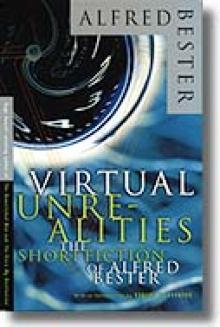 Galatea Galante
Galatea Galante Hobson’s Choice
Hobson’s Choice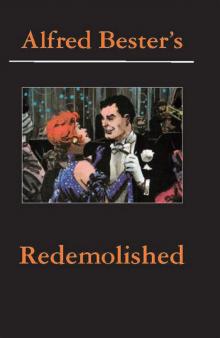 Redemolished
Redemolished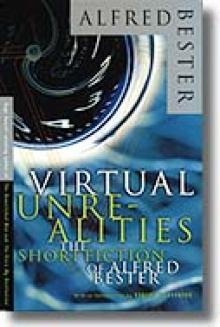 The Flowered Thundermug
The Flowered Thundermug The Starcomber
The Starcomber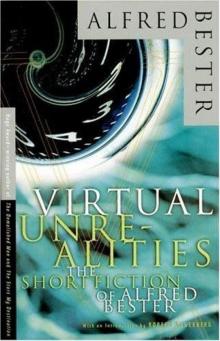 Virtual Unrealities: The Short Fiction of Alfred Bester
Virtual Unrealities: The Short Fiction of Alfred Bester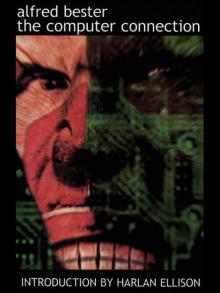 The Computer Connection
The Computer Connection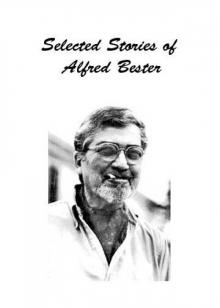 Selected Stories of Alfred Bester
Selected Stories of Alfred Bester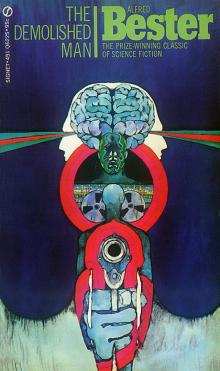 The Demolished Man
The Demolished Man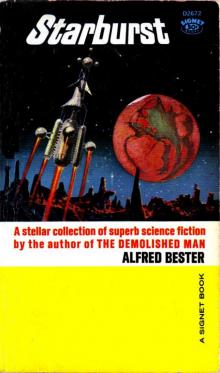 Starburst
Starburst Psychoshop
Psychoshop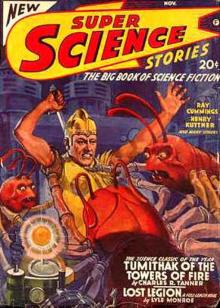 Biped Reegan
Biped Reegan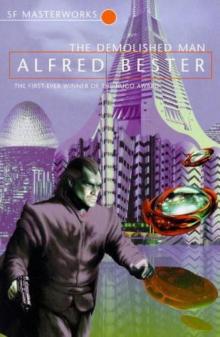 Demolished Man
Demolished Man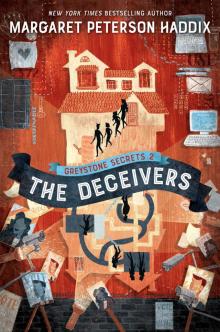 THE DECEIVERS
THE DECEIVERS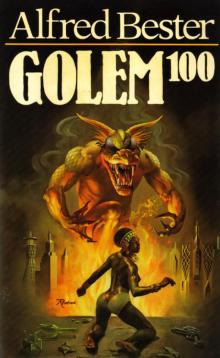 GOLEM 100
GOLEM 100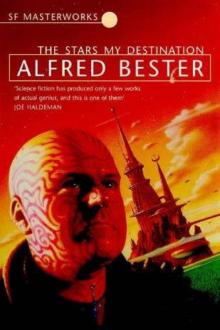 The Stars My Destination
The Stars My Destination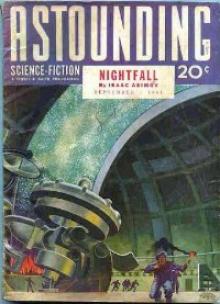 Adam And No Eve
Adam And No Eve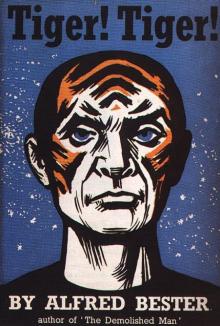 The Stars My Destination ( Tiger! Tiger! )
The Stars My Destination ( Tiger! Tiger! )